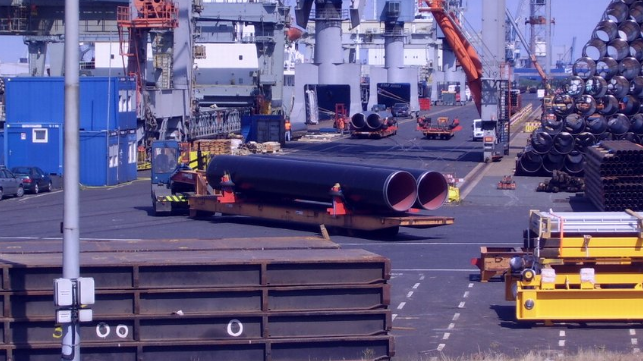Despite tariff concerns and driven by new energy projects, breakbulk cargoes at U.S. ports are growing.
_x000D_
 file photo
file photo
_x000D_
By Tom Peters 2018-12-26 23:55:19
_x000D_
_x000D_
(Article originally published in Sept/Oct 2018 edition.)
_x000D_
_x000D_
Maritime research consultancy Drewry suggested earlier this year in its “Multipurpose Forecaster and Annual Review” that the multipurpose shipping market, which includes both breakbulk and project cargoes, would show improvement this year after a few years of downturn.
_x000D_
_x000D_
“This year has started with renewed optimism,” noted lead analyst Susan Oatway, “and it is Drewry’s belief that the market has finally turned the corner. Rate rises are never stratospheric in this sector, but we believe a steady growth of around two to three percent per year is possible.”
_x000D_
_x000D_
Tariff Concerns
_x000D_
_x000D_
However, with the unpredictable impact of tariffs by the Trump Administration, getting to a two or three “percent increase on these types of cargoes is a bit concerning for some ports. “We continue to monitor the tariff situation,” says Bill Hensel, Manager of External Communications for Port Houston. “Our steel volumes through the end of July were 2.6 million tons compared to 2.0 million tons for the same period in 2017.”
_x000D_
_x000D_
So it’s “so far so good,” at least for Houston. As the biggest breakbulk port in the nation, Houston handles a wide variety of cargoes. “Each terminal is uniquely designed to handle a wide range of cargo types to meet customer needs,” Hensel explains, “from steel to heavy-lift project cargoes to wind turbines and blades. Houston is the national leader for breakbulk cargo due to the large laydown areas located adjacent to the general cargo and heavy-lift docks.”
_x000D_
_x000D_
Farther south at the port of Freeport, Texas, Director of Business & Economic Development Jason Miura agrees there has been little impact from tariffs to date but cautions: “However, over time there is concern the sanctions on steel imports could affect pipe and steel billet imports and lead to delays in future petrochemical projects along the Gulf Coast due to the added cost. Tariffs could delay or even prevent an estimated $110 billion of new petrochemical projects by adding or threatening to add 25 percent to the cost of these investments. Imagine a $4 billion project becoming a $5 billion project overnight!”
_x000D_
_x000D_
Miura says most of these new plants would likely manufacture resins and petrochemicals for exports, so Gulf Coast states like Texas and Louisiana – and the U.S. as a whole – could lose a golden opportunity to positively impact the deficit and create thousands of new jobs if they do not come to fruition. “Add to this the fact that all the roads, bridges and highway improvements that states are eyeing could be delayed or cost 25 percent more to build and you have a recipe for potential disaster,” he adds.
_x000D_
_x000D_
Fueling Growth
_x000D_
_x000D_
That being said, one industry that’s fueling the growth Drewry predicted is energy, and it’s a positive for Freeport. “Being located in Texas, shale oil and gas are the greatest drivers of breakbulk and project cargo we have,” Miura states. “Over the last five years we have seen petrochemical manufacturing and gas production facility investments of approximately $25 billion in our navigation district.”
_x000D_
_x000D_
Another Texas port, Corpus Christi, which bills itself as “America’s Energy Port,” received its first shipment of wind turbine components in July at its new Rincon West Yard. Wind turbine manufacturer Vestas will import nacelles, hubs, drive trains and blades through the Rincon West Yard for the Blue Cloud Wind Farm in the Texas Panhandle.
_x000D_
_x000D_
“The future of wind energy is important to Corpus Christi and the U.S.,” says CEO Sean Strawbridge, “and our Rincon West Yard is an incredibly viable logistics option for the innovative wind energy industry. The port is proud to play a support role for Texas in leading the nation in wind energy development, and we are pleased to partner with Vestas in facilitating the transportation of wind energy infrastructure to the Blue Cloud construction site.”
_x000D_
_x000D_


